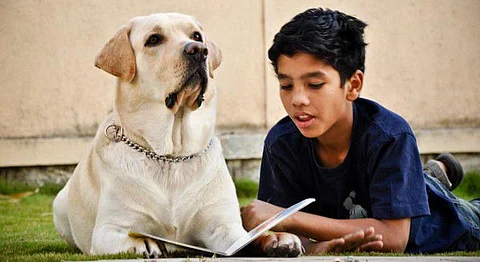
- HOMEGROWN WORLD
- #HGCREATORS
- #HGEXPLORE
- #HGVOICES
- #HGSHOP
- CAREERS
- ABOUT US
- CONTACT US

After eighteen pampered years of staying with my family in a small town, I moved into a sprawling Girls’ Hostel in a much bigger, newer city for my undergrad studies. First thing I saw when I was moving in? Swarms of girls floating about in a cloud of chatter and laughter – and two giant Labradors bouncing about in the middle of the hostel.
I was curious: almost certain that they weren’t batch mates of mine starting out at university, I wondered why there were two dogs staying with us at the hostel. Later on, I was informed that they were trained therapy dogs – meant to make us feel us feel at home, far away from home. Although I was a little skeptical about this at first, over the first few months I realized that the girls loved the dogs and they were nothing short of family for them. This was my first brush with Animal-assisted therapy – and with realizing the kind of therapeutic impact animals can have on a person’s life.
As a form of healing, the goal of Animal-Assisted Therapy (AAT) is to improve a patient’s social, emotional, or cognitive functioning. In fact, this is one of the only forms of alternative psychotherapies that works with a special focus on children suffering from mental and speech disabilities.
For instance, a game of fetch with a therapy dog can motivate a wheelchair-bound child with cerebral palsy to move her limbs. Many children with social ineptitude find a friend in a therapy pet, making them less scared of their surroundings. In the end – as many pet-owners will testify – pets are a soothing refuge during difficult times. Young or old, you will always find a sense of calm, comfort and safety with a therapy pet.
Though dogs are used most frequently as therapy pets – since they are easy to train, other animals such as horses, fish and cats also help with patients of different age groups. Contacts with these pets help in decreasing signs of depression, owing to a rise in endorphin levels – also affecting self-esteem and motivation positively.
Animal-Assisted Therapy is little known as a form of healing, but a few places in India have recognized the simple benefits of a good old time with man’s best friend and opened their doors to those who need it. Here’s four such centres that let unwind and heal with therapy pets!
I. Animal Angels Foundation (AAF)
Location: Mumbai
Animal Angels Foundation is India’s first organization that started working with Animal-Assisted Therapy. It was founded by clinical psychologists and certified AAT practitioners Rohini Fernandes and Rhadika Nair in 2005 with a sole Labrador dog – owned by Rohini – and now is linked to 20 family dogs. With a mission of enriching people through therapy animals, AAF works with a range of schools and mental health centres, conducting frequent workshops. They also offer their services to individual adults and children.
II. Manav Foundation
Location: Mumbai
Manav Foundation prides itself on their lovely cat “Simba”, who works as a co-therapist here for individual and group sessions with clients. Working in partnership with Animal Angels Foundation, Manav aims at initiating a process that hat improves communication and interaction in in interpersonal relationships of the clients.
III. Wag-Ville
Location: Bangalore
Though primarily a boarding and day-care centre for dogs in Bangalore, Wag-Ville offers an excellent course of Animal-Assisted Therapy under the “Paws and Hooves Project”. They offer both Canine-Assisted Therapy and Equine Assisted Therapy for individuals with special needs like Autism, Cerebral Palsy, ADHD, Down’s Syndrome, etc. Located in a beautiful coconut-grove in North Bangalore, Wag-Ville promises safety and a soothing environment for clients who avail Animal-Assisted Therapy here.
IV. Fur-Ball Story
Location: Delhi
FurBall Story is a truly unique initiative that makes Animal-Assisted Therapy much more accessible. With a threefold mission of encouraging adoption, increasing productivity and decreasing animal abuse, FurBall story has truly taken the AAT a step forward. Book a session with FurBall, and they will bring their fur army to your residency, office, hospital or even schools! Their trained animals are well-versed with the difficulties faced by people at each of these locations and help them accordingly. Check out their website to book a session!
Not all of us mingle with animals easily – many people are, in fact, quite scared of pets. However, these centres are the best place to step out of your comfort zone and seek an alternative way to heal. Cementing friendships as well as mental and physical healing, Animal-Assisted Therapy is a true testimony to the fact that a pet is indeed a man’s best friend.
If you liked this article, we suggest you read:
